Disclosure: Meeple Mountain received a free copy of this product in exchange for an honest, unbiased review. This review is not intended to be an endorsement.
Welcome to the Unfair City. Here in this bustling metropolis, a strange contest of sorts is afoot. Several new theme parks have popped up and are vying to be the best in the city. City officials thought this would be great for revenue, but things start spiraling out of control quickly as each park works to not only to build new attractions, but also sabotage the other parks in the process. It’s going to get very competitive in the entertainment industry, so swing by and see what all the fanfare is about in Unfair.
Theme is King
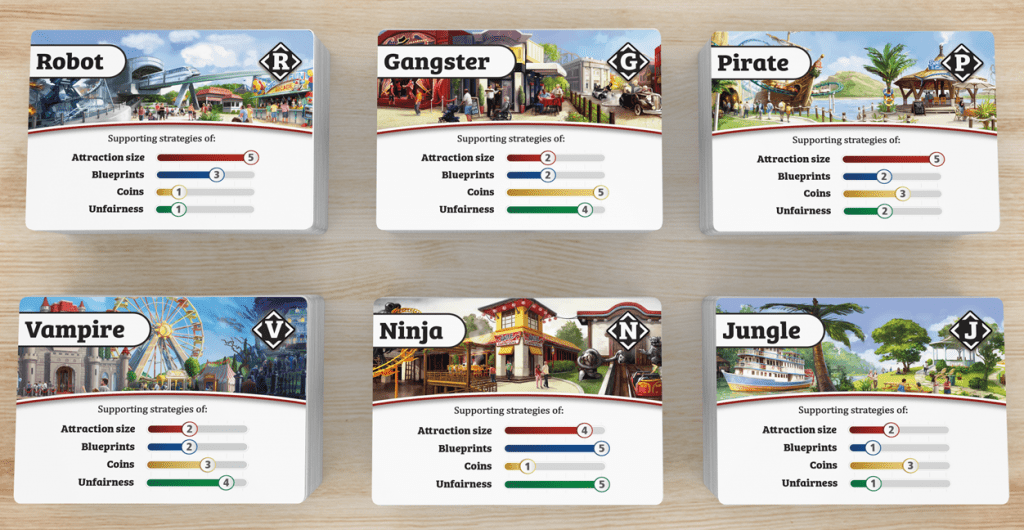
Unfair is played over the course of 8 rounds with each player attempting to build the best “engine” of a theme park from the plethora of cards that come in the game. Each game is different with players selecting one of the 6 distinct themes with which to build the game deck. Each theme has its own unique deck of cards with a different twist or mechanism. The themes that are selected and the way they act and interact creates a new experience each time you play Unfair. Perhaps you love the gangster theme which allows you to steal a lot from opponents, or maybe you enjoy the Ninjas who are sneaky and gain some neat ways of getting extra points. No matter the theme the combos are always fun and enjoyable. While each deck of cards has the same general makeup, the style and mechanics in each are quite different and are very asymmetric.
How to Build Your Park
Each player begins the game with a main gate and six slots for attractions; the goal being to create the best park in all of Unfair City. You can build attractions from your hand or directly from the market by paying the associated coin cost and placing them in one of your attraction slots. Once built, attractions will generate income based on the number of stars on the card. Attractions can also be upgraded with a plethora of upgrades: from comfy seating to quality ratings and lockers for your coat. Upgrades can add stars to your attraction which boost income and icons which increase end game scoring (and often will be needed for completing blueprints which can grant a lot of end game points if completed).
Also included in the park deck are staff members: cards which do not take up space in your park but often bring with them a very useful skill. Many staff members will allow you to interact with other parks or reward you with money for having certain types of attractions in your park. Staff can really help boost your income or player interaction depending on what themes are in play!
Along with basic attraction come super attractions. Each deck has two at the start of the game and these are shuffled and randomly dealt to each player. These attractions are costly and cannot be built until you have at least five stars worth of items in your park, but they always have a very powerful ability they bring to bear as well. Plan wisely as a good super attraction can be a game-changer.
The Tools of the Trade
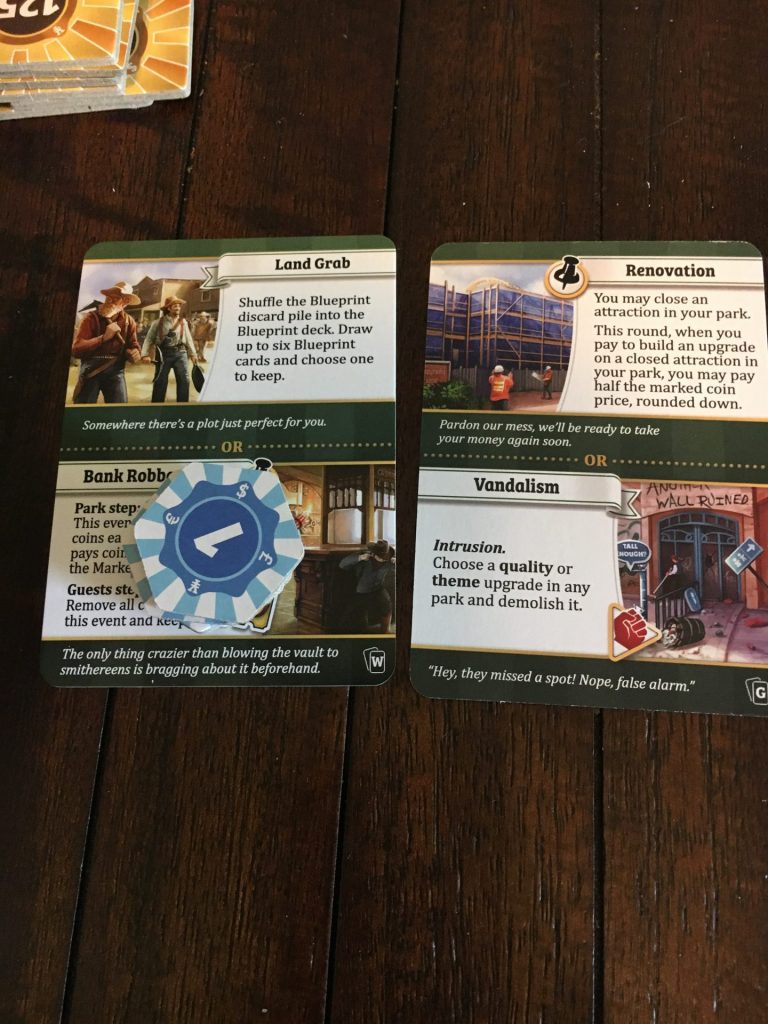
Now that we have a very light understanding of Unfair, let’s walk through the components of the game and a round of play. Each round starts with an event phase in which players will draw and play any event cards they desire. Event cards have two options that are usually played during the event phase and do all sorts of things from granting you extra income to demolishing opponents upgrades in their park. Also, each round a city event is played during this phase. The first few rounds are always nice and positive but the last four rounds usually contain negative events for all players. It’s not called Unfair for nothing!
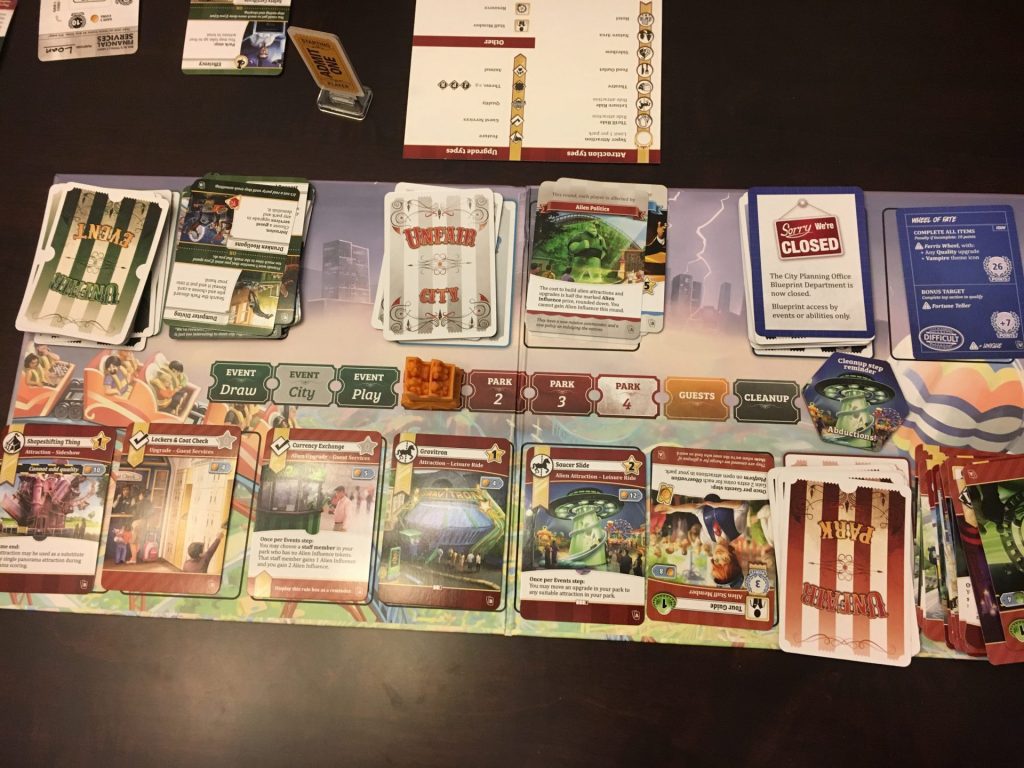
Next comes the park phase where players each take 3 turns per round building their park, recruiting staff cards or drawing event or blueprint cards. Blueprints are end of game bonuses awarded by completing certain criteria such as having a thrill ride attraction with a certain type of upgrade on it. These challenges range from easy to insane difficulty and reward points accordingly. In all of the games I have played I have not seen an Insane Blueprint completed. These cards can be quite rewarding but it is important to remember that any failed blueprints will penalize you points at game end so make sure to plan carefully!
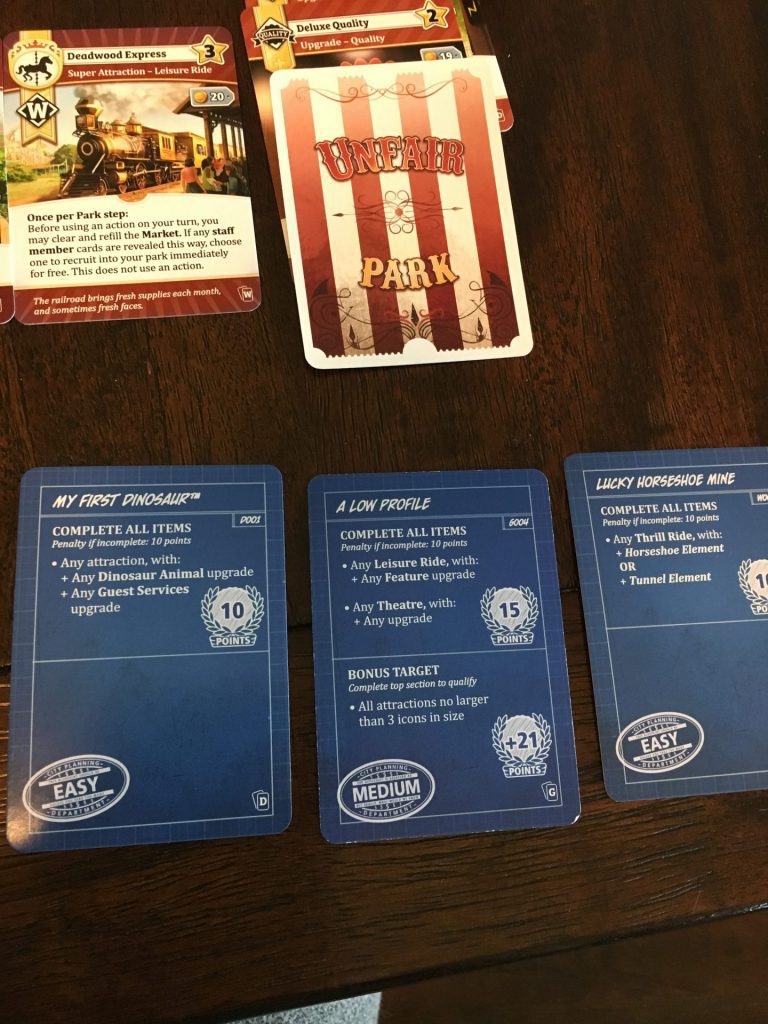
Once everyone has completed their park actions, you move to the guest and cleanup stages where you calculate your income from guests and bonuses for the round as well as refresh the market with new park cards to buy. After the 8th round of play, players will score each of their attractions separately based on the number of icons present from upgrades, blueprints, staff points and any remaining coins they have. The highest scorer is the king of Unfair City!
Must be This Tall to Ride
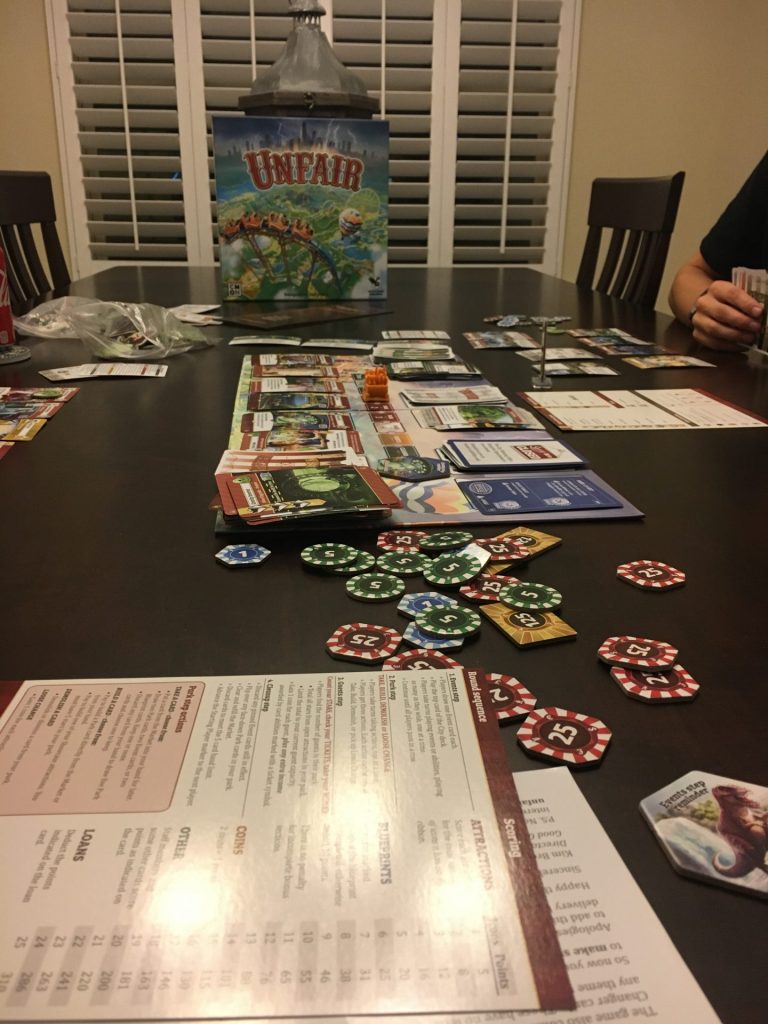
Unfair is a brilliant and enjoyable card-based engine building game where I can truly say no two games will be the same…well unless you play A LOT! There are so many viable choices for a strategy and it is very enjoyable to ponder which direction you should take. After the first four rounds of the game, it becomes harder to get blueprints so you are forced to choose betweencontemplate collecting them early or risking not having any later. Unfair offers many ways to build your park, upgrade it and interact with your opponents to slow their progress and muddle their blueprint progress.
Unfair is a subtle “take that” game which means there can be some very underhanded and cutthroat interactions between players. This along with some random bad luck from city events can take you from “easy win” to “struggling to swim” in a heartbeat. So is Unfair, unfair? I personally love “take that” games and engine builders so seeing this beautiful chimera of what I love emerge from Good Game’s creative and talented minds is a treat for me! I can understand how this game may not be for everyone as sometimes the best-laid plans can go helter-skelter by player interaction and some bad luck in city events. Life, like Unfair, has taught me to roll with the punches and enjoy the ride but I can see how that may not be for every gamer.
The only real drawback to a card heavy game such as Unfair is the cleanup time. Since you are combining a different deck of cards for each player in the game, separating them and returning them to board game Fung Shui is a bit of a time crunch. Thankfully each card is clearly indicates into which deck it goes but it is worth noting. All in all, I thoroughly enjoyed my time with Unfair and hope to sucker more fellow gamers into witnessing my ne-FAIR-ous” rise to theme park power!
If this all sounds great you can find out more information about an Unfair expansion in our review of Alien, B-movie, Dinosaur, Western.
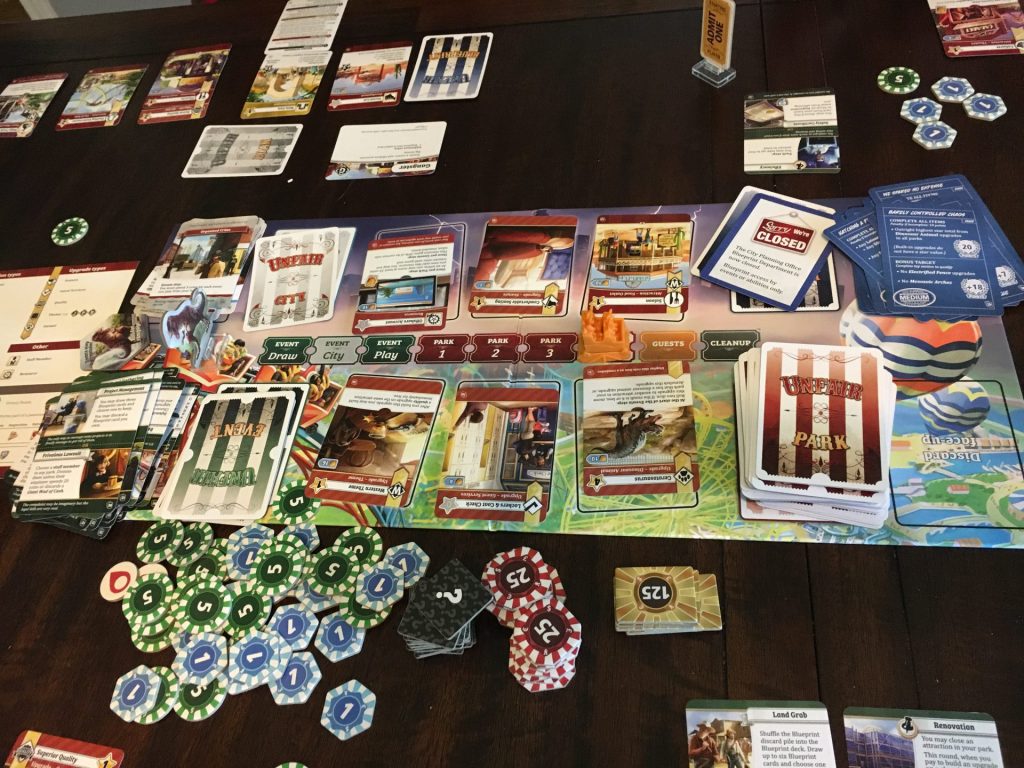
Unfair
Genre: Engine Builder/Take That
Pros: INSANE replayability, variable strategies for success, engaging end game bonuses, enjoyable tension and player interaction
Cons: card sorting and clean up, some luck elements in events, allows focused and impactful player interaction
Rating: 9/10 A somewhat hidden gem that deserves a lot more praise than I have heard about it. A guilty keep for my collection.


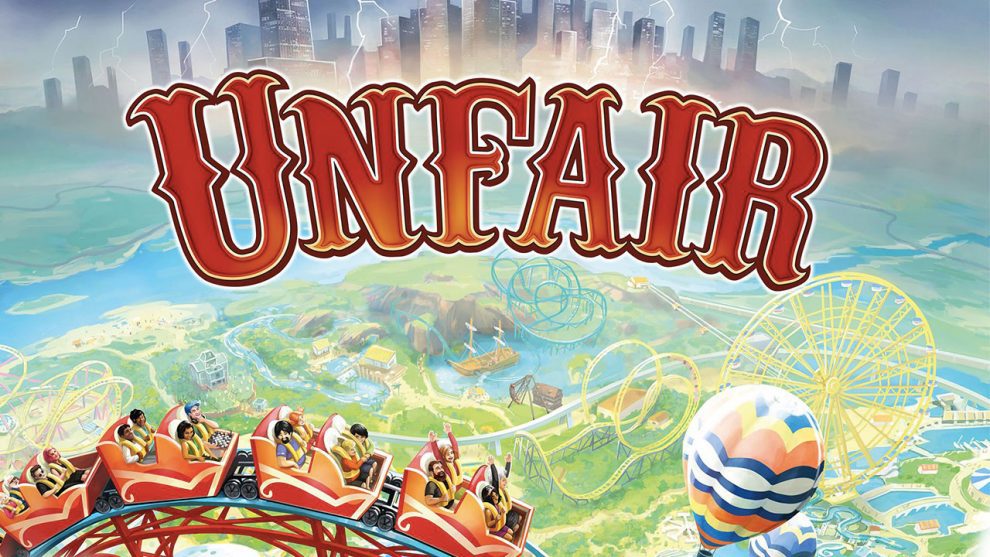
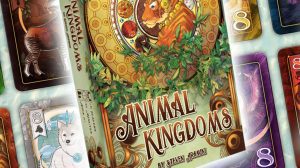
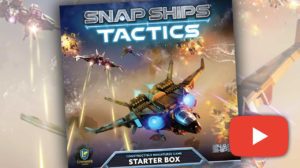






Add Comment